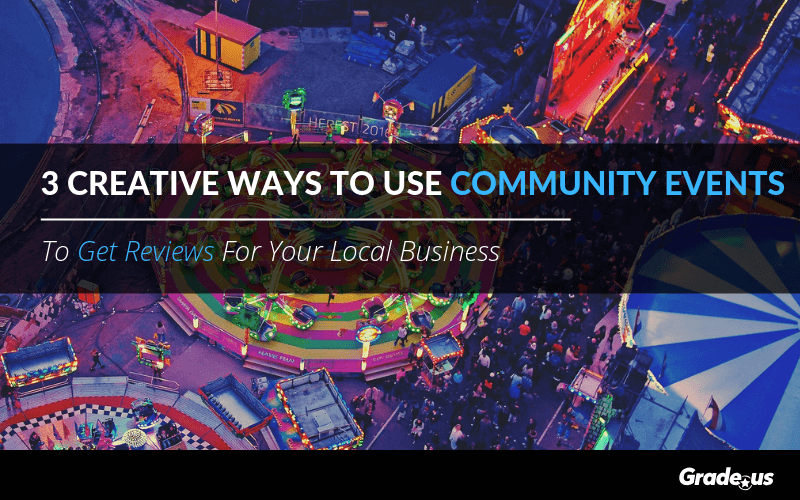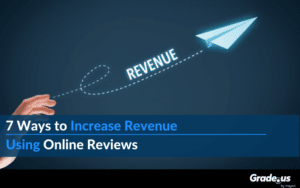Do you know the secret the secret behind successful community events?
These events are an incredible way to generate a significant amount of traffic, leads and sales. It's also an amazing way to get reviews.
Which leads to more traffic, leads and sales.
It's the virtuous cycle most businesses would love to have. So, why isn't it working for many organizations?
Reciprocity.
Reciprocity is the secret to successful community events
But, it's often ignored.
Most marketers, business owners and entrepreneurs are familiar with reciprocity. Most of us are also familiar with the Cialdini classic, Influence. You know what it is. I know what it is.
Right?
It's a desire to return a favor or good deed, plain and simple.
Is it though?
Dig deeper and we find some interesting things about reciprocity. Actions you'll absolutely need to take to be able to make your community event a success.
Your actions expose your motive
Use the wrong type of reciprocity with your community event and you may end up repelling attendees rather than converting them. Forget about getting a review.
If you use...
· Calculated reciprocity communicates conditional giving to event coordinators, attendees and customers. That the good you do isn't a gift, it's a loan. Something you expect will be paid in return. Ever been to a seminar or workshop with a high pressure sales pitch at the end? Was it a turn off? That's calculated reciprocity at work.
· Symmetrical reciprocity depends on affection but it doesn't work well with new attendees/customers. They need time and repeated interactions with you to determine whether they "like" you or not. Research shows reciprocity works whether we like each other or not. But symmetrical reciprocity works best when you're preaching to the choir, to people who already like you.
· Attitudinal reciprocity follows the "if you're nice to me, I'll be nice to you" paradigm. That's a problem if your attendees aren't nice. Your event attendees don't know you. They may approach you with skepticism, distrust and disdain. This isn't ideal but it's also not uncommon. Your relationship with attendees develops naturally if you're unaffected by their psychological frame.
We're left with one option.
· Altruistic reciprocity. You create and launch your community event with your attendees in mind. If your community event is developed around altruism your event will (a.) deliver value to your co-presenters, partners and allies. (b.) deliver immediate value to your attendees followed by consistent, long-term value (c.) orient and align your interests with those you'll serve, putting their needs first.
See the difference?
Community events are relationships by proxy
They're evaluation mechanisms.
Attendees don't know you. Event managers aren't sure they can trust you. They may not even be considering you as a solution to their problem yet.
They all need a win.
You'll need to deliver a significant amount of value before they're willing to write a five-star review for your local business.
This is the foundation of your community event.
Approach your event managers and attendees with an attitude of altruism then create value. Respond to their behavior (good or bad) with goodness, generosity and altruism and things work well for you.
Okay...
How do you go about doing that? Let's take a look at a few strategies.
Strategy #1: Find similar audiences
You'll need a list of groups. Influencers, organizations and groups that have access to your audience.
So, if you're a...
· Marketer, you can gain access to libraries, local networking groups, investment clubs, rotary clubs and chambers of commerce. You can also gain access to local online publications and forums.
· Contractor, you can reach out to real estate investment clubs, networking groups, home improvement expos and retail outlets like Lowes, Menards and Home Depot.
· Restaurants, can approach libraries, community festivals, thematic events (e.g. Greekfest), cooking clubs, and foodie meetups.
Next, you'll need a list of value pieces. These ideas could be...
· Content in the form of education and information e.g. "how to" education, secret processes, important data, etc.
· Connections to powerful people whether those people are influencers, leaders, audience builders or power brokers
· Access to helpful formulas, tools and resources. This could be mathematical formulas, algorithms, secret processes, software applications, proprietary checklists and worksheets
· Ability to raise capital and create resources. This could be important know-how regarding a specific venture capital firm. It could be a list of banks with friendly terms who are looking for small businesses. It can also be access to money
Got your list?
Fantastic. Write the types of groups you'll be targeting and the audience you're looking to attract.
The objective here is simple.
You're going to analyze the groups and organizations in your list. You'll need to come up with a distinct offer that meets at least one of the following criteria.
1. Risk free. It takes little to no effort for attendees to act on your request. You assume most or all of the risk.
2. Satisfies a pain point. Fulfills a desire, meets a goal, relieves a fear or solves a problem.
3. It's fascinating and irresistible. A compelling offer that exceeds attendee/customer expectations on multiple fronts.
Your offer should meet at least one of these criteria. A "perfect" offer meets all three of the criteria mentioned above.
Your list is indispensable.
These people/organizations are going to feed you a steady supply of customers, leads, sales and reviews. And they're going to do it for free.
That's because you're going to...
Strategy #2: Pitch value to local venue/partners
Do you have the right mindset?
Many businesses don't.
They approach the people on their list with trepidation and doubt. The thought "what if they say No" swirls around in the back of their mind. This mindset creates failure from the beginning.
It's also a false narrative.
See, it's actually the opposite. The people and organizations on your list are always on the lookout to provide value to their audience. Here's why that's a big problem.
They're insatiable.
These organizations are under the gun. They're expected to provide the community with a consistent stream of value via events. That's incredibly difficult to do long-term which is precisely why they're starving.
That's where you come in.
Using your in-depth knowledge of their needs, you pitch ideas to them. You implement the ideas they like. Your pitch could look a little bit like this:
Hi Jan,
As you know, I'm a long time follower of [janswebsite.com].
You're the go-to resource for entrepreneurs and agencies in the area. If I could arrange a 15 to 30 min. webinar/call with [Neil Patel] or [Rand Fishkin] would you be interested?
I can arrange a call about a month from now.
Interested?
Andrew McDermott
Just one problem.
What if you don't know any famous people? What if you have zero people in your address book? It's no problem if you lead with value.
Does contacting an "A list" influencer sounds intimidating or difficult? Start with "C" and "B list" influencers, leapfrogging your way up the list.
How?
By becoming a connector.
Figure out what your influencer wants. Did they just release a new book? Are they trying to promote their new menu, podcast or storefront? Identify their desires then play the role of influencer, connecting them with locals who can meet their need.
Like this:
Hi Neil,
I love Hustle! I purchased a copy of your book for myself then bought 12 more copies for family and friends. It's amazing!
There are several local groups in my area with an audience size of (approx. 17,000 - 63,000) people. They're interested in hearing more about your book. Would you be open to a short 15 min. interview or webinar?
I'd love to help get your book in front of more people.
Let me know,
Andrew McDermott
First, identify the bait pieces you'd like to use. If it's access to key influencers, reach out to them first. Then once you have your bait pieces set, approach your local venues/partners.
Create an introduction or broker a deal.
Note:
Make sure your message is short, focused and to the point. Avoid rambling or telling either side your life story. Give them just enough information to establish your credibility (e.g. your website, social media accounts, etc.).See what I did there?
My pitch assumes every group, organization or event is desperate for value. The kind you can provide.
That's your in.
Strategy #3: Implement and track your performance
Creating and hosting an event is a lot of work. Event managers have a particular goal, purpose or objective in mind. They're willing to accept the pain of hosting an event to reach that goal.
Most don't reach that goal.
It's your job to discover what that goal or purpose is. Then, it's your job to help them smash through that goal or purpose.
Here's how.
Step #1: Create or improve an event
· Run a quarterly or annual food / charity drive. Philanthropic pursuits (e.g. volunteering, charitable, educational, religious or public interest) that frames locals as noteworthy patrons. Focus your attention on giving exclusively and you'll attract a large amount of customer attention, indirectly generating the reviews you need.
· Host local seminars or events for groups in your list.
· Pitch relevant classes, workshops or seminars to the libraries in your community. Libraries come with two wonderful benefits (a.) sister libraries networked by city, county and state (b.) a large audience via people who live in the city. Teach their members something relevant and valuable. Then provide them with a compelling offer to attract them to your business.
· Introduce influencers, thought leaders, power brokers, organizations, etc.
· Sponsor up-and-comers in the community. Find up and comers in your city. Identify people with potential in the city, then find a genuine way to recognize them in the city. You can do this via meetups, events, career days, networking groups, fairs or simply just by promoting them.
· Add/recommend speakers for the events in question (see above).
· Provide event managers with the exclusive content, resources, tools or connections they'll need to achieve their goals. Attendees have specific goals in mind (e.g. education, entertainment, etc.). Help event managers please their audience in exchange for access. Convert that access to value (e.g. subscribers, customers, etc.) then request reviews.
· Make it a systematic goal to teach community event attendees a specific skill. You can work with local organizations (e.g. rotary clubs, networking groups, cooking clubs, YMCAs, boys and girls clubs, etc.). Make it a systematic goal to teach their audience and it eventually becomes your audience. Then, ask your audience for reviews.
· Launch a festival or annual celebration.
· Provide local educational institutions with scholarships for locals. Then approach your audience and ask them to promote it as well. Focus on serving your audience on the front end. Play the long game, focusing your time and attention on those you serve.
· Provide your target organizations with answers to questions they want but don't have.
· Drive attendees to a tour offered by a (tangential) local business. Drive your audience to a local business that serves the same customer you do in a relevant yet complementary way. Do it repeatedly for several businesses. Then, offer to increase their revenue by sending customers back to your business. You can split the revenue from sales made from your product or theirs. You can private label their product or service and split the revenue or do something else entirely.
· Host community games where the winner receives an incredible prize, press attention and a significant amount of prestige (e.g. first attendee to find the missing ____ wins a ____).
· Speak, present or co-host a local or regional conference. Deliver value for a price, ensuring that you're paid well for your speech or presentation. Go out of your way to over deliver. Pitch another speech or presentation, but this time, offer to do it for free. Do it in exchange for access (email, landing pages or advertising). Deliver even more value than before.
· Host events that serve or honor tangential audience (e.g. events to honor fallen veterans, tree planting to help the environment, etc.).
· Create secret events that require hidden details, a secret password, entrance or Easter egg. Tie your details to existing community events. Offer a tiered reward system rewarding participants, finalists and winners. Make sure prizes are relevant to the product or service you offer.
· Use fishbowl conversations to discuss taboo industry topics with a specific audience (e.g. professionals, experts, customers, and partners). Use it to build brand recognition. Play the long game. Handled well, this attracts, a significant amount of indirect customer attention.
Step #2: Do/give what others can't/won't
· Provide a much needed, but ostensibly impossible introduction.
· Create an event that achieves an "impossible" metric (e.g. gathering sponsors to feed homeless in the entire city).
· Spontaneously provide value to event attendees (e.g. all attendees receive a free ____).
· Show a particular audience segment (e.g. homeowners) how to achieve the seemingly impossible (lower tax bill).
· Indirectly serve your audience (e.g. if your customers are moms, pay for a kid's free day at the local children's museum).
· Become an event Santa. Randomly crash events, then help/serve attendees and presenters.
· Share access to valuable, yet legal secrets (e.g. a database, list, plan or process).
· Provide key influencers, up-and-comers and the exceptional an opportunity to achieve a deep desire.
· Give event attendees a platform to share their thoughts, concerns, and feedback.
· Consistently gain access to valuable people, information, tools and resources. Then share this information with the right people, at the right time.
· Create a gold rush, something event attendees desperately want but can only get from you. Market your offer with each of the event hosts and presenters.
Step #3: Capture value, ask for feedback
1. Make an offer to event attendees. Be sure to create an offer that's relevant. It should be irresistible, risk free or a solution to a deep desire, fear, pain or problem.
2. Ensure your offer is redeemable on a platform you control (e.g. your website, Facebook page, etc.).
3. Add relevant customers to your marketing funnel.
4. Create a follow-up system that provides them with education, tools, resources or connections
5. Pitch your product or service.
6. Then, ask for an honest review, after you've exceeded their expectations. Rinse and repeat.
Step #4: Tracking traffic, sales and review requests
You'll want to make sure you're tracking the results from your community events. Here are three simple steps you can follow.
· Traffic goes through you first. No exceptions. If you're driving traffic to an event manager, send them through a property (e.g. landing page, microsite, QR code, etc.) you control first. Monitor your campaigns and link up with analytics tracking tools like Google Analytics.
· All offers go through you. If you're sharing value with an event manager, make sure attendees go to a property you control to redeem your offer. If you're giving away a free checklist, offering a quiz, delivering a service, require event attendees to come to you directly. This enables you to track performance by event.
· Integrate analytics with review management software. Use URL and event tracking parameters. Make sure parameters are event specific and focused on your goals (e.g. events, leads, sales, revenue, etc.). Integrate these tracking parameters in your review request email drip campaign.
Everything you need to convert community events into amazing reviews for your business.
The sky is the limit.
Work with existing community events or simply create your own. You can create a successful campaign with either option. But only if your motives are based on altruism.
When you "give to get" you turn off your audience. There's a maxim that attracts event managers, attendees and customers.
Give to forget, Receive to remember
Give generously, continuously and consistently. Receive to remember, working to pay the good you've received forward. Work to provide value for those around you regardless of whether you'll get anything in return. Capture a percentage of that value with relevant offers.
It's a frightening way to run a business.
Paradoxically, it's also the way you reap the greatest rewards for your business. Create or improve an event, it really doesn't matter. Just make sure your interests are aligned with everyone - event managers, attendees, customers.
Community events aren't a fit for everyone
They're the perfect fit for local businesses. They're an incredible way to generate a significant amount of traffic, revenue and reviews. But there's a secret to successful events.
It's reciprocity.
Reciprocity is the key to successful community events. They're the gateway to amazing customer feedback. Get reviews from the right people and you create a virtuous cycle. Where your business grows on autopilot.
But only with the right kind.
Actions expose motives. Use the right kind of reciprocity with your community event and you'll attract the event managers and attendees you need to grow your business. Align your interests with altruism and you'll find community events generate the results and reviews your business needs.
About the Author
Andrew McDermott
Andrew McDermott is the co-founder of HooktoWin. He shows entrepreneurs how to attract and win new customers.











